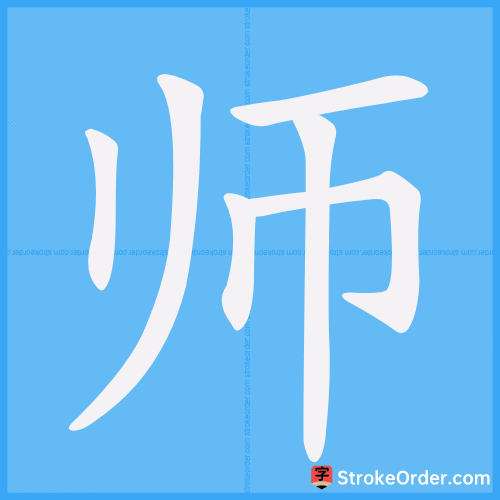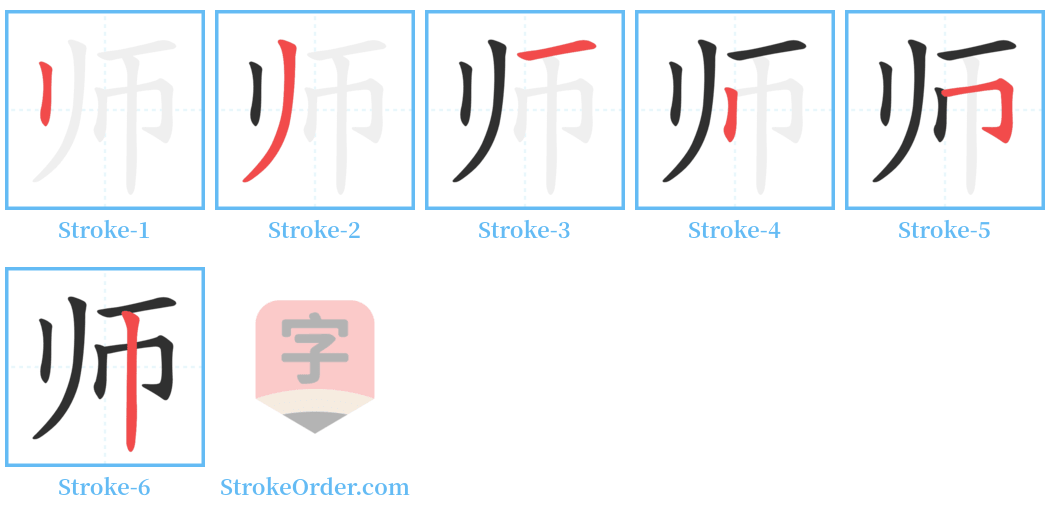师 Stroke Order
Animated Stroke Order of 师

Stroke Order Diagrams for 师

Step-by-Step Handwriting Guide for 师

Learn to Write Chinese Characters with Video Tutorials
Watch the video of writing the Chinese character "师", learn the correct stroke order (笔顺) of the character "师", and master the standard way of writing the character "师".
Free Printable Handwriting Practice with Stroke Order: 师
Printable Writing Practice Worksheet of "师" in Portrait Orientation (Tian Zi Ge)

Printable Writing Practice Worksheet of "师" in Landscape Orientation (Tian Zi Ge)

Information of 师
Pinyin
shī
Radical
巾
Strokes
6 strokes
Usage
★★★★★
Definition
a division (milit.) / teacher / master / expert / model
师 shī
1. 教人的人。
A person who teaches.
例如:老师,导师,徒弟,徒生,师德,良师益友,好为人师。
For example: teacher, mentor, apprentice, benefactor, good moral teacher, good friend.
2. 擅长某种技术的人。
A person skilled in a certain trade or expert in a certain profession.
例如:工程师,医生,技师。
For example: engineer, doctor, technician.
3. 效法。
To imitate.
例如:师法古人。
For example: to follow the ways of the ancients.
4. 榜样。
A model or fine example.
例如:师范。
For example: role model.
5. 指由师徒或师生关系产生的。
Referring to relationships formed between master and student or teacher and student.
例如:师母,师兄,师弟,师妹。
For example: master’s wife, elder brother of the same teacher, younger brother of the same teacher, younger sister of the same teacher.
6. 对和尚或道士的尊称。
A respectful term for monks or Taoists.
例如:法师,禅师。
For example: Dharma Master, Zen Master.
7. 军队。
Army or troops.
例如:会师,出师。
For example: troop assembly, to dispatch troops.
8. 军队的编制单位,团或旅的上一级。
A military unit that is a higher level than a regiment or brigade.
例如:师长,师座。
For example: division commander, division headquarters.
9. 一国的首都。
A country's capital.
例如:京师。
For example: capital city.
10. 姓。
A surname.
例如:师。
For example: the surname Shi.
【本义】: 古代军队编制的一级。二千五百人为一师。
Original meaning: A division in ancient military organization, consisting of 2,500 men.
【造字法】: 会意。从币,从垖。垖是小土山,帀是包围。四下里都是小土山,表示众多。
Character formation: A semantic combination, composed of "currency" and "small mound," indicating multiplicity.
11. 同本义。
Same original meaning: division.
12. 师今为隶属于军的单位,下辖若干旅或团。
Today, a division refers to a military unit that controls several brigades or regiments.
13. 泛指军队。
A general term for the military.
例如:水师(水军),挥师(指挥并带领军队)。
For example: navy, to lead troops.
14. 军师。
A military strategist.
15. 民众,徒众。
The masses.
16. 古代行政区划单位。
An ancient administrative division.
17. 老师。
Teacher; master.
例如:师者,所以传道受业解惑也。
For example: A teacher is someone who imparts knowledge and solutions.
18. 对僧、尼、道士的尊称。
A respectful term for monks, nuns, and Taoists.
例如:师太,师丈。
For example: venerable nun, elder monk.
19. 长,首领。
Leader or chief.
20. 亦以称专司一事的神道或官员。
Also refers to a deity or official dedicated to a specific duty.
21. 首都,京城。
Capital or central city.
例如:因入京师。
For example: entered the capital.
22. 擅长某种技术或在某个领域里有特殊技能的人。
A person skilled in a specific trade or with special skills in a certain field.
例如:厨师,乐师。
For example: chef, musician.
23. 学习的榜样。
A model for learning.
例如:前事不忘,后事之师。
For example: learn from the past to guide the future.
24. 姓。
A surname.
动词用法:
1. 效法;学习。
To imitate; to learn.
例如:师古(效法古代)。
For example: to learn from the ancients.
2. 出兵征伐,进军。
To dispatch troops; to advance.
例如:师祭(古代军队出兵时所行祭祀祈祷之礼)。
For example: a ceremonial sacrifice before dispatching troops.
Input Method for 师
Pinyin
shi1
Wubi
jgmh
Cangjie
llmb
Zhengma
kdal
Four Corner
21027
Unicode
U+5e08
Same Pronunciation Characters